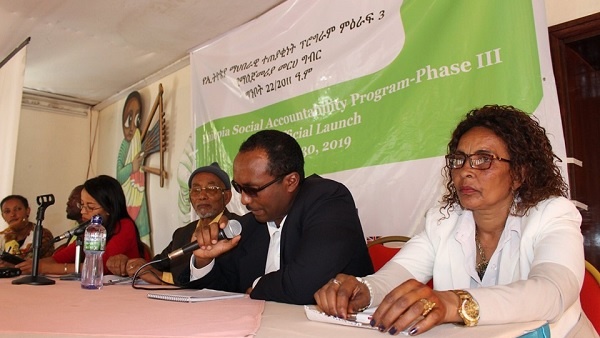
ADDIS ABABA – Phase 3 of the Ethiopia Social Accountability Program (ESAP) was launched on 30 May 2019 in Addis Ababa, Ethiopia.
This new ESAP program builds on the achievements of the previous phase, which objective was to strengthen the capacities of citizen groups, representatives and government to work together in enhancing the access and the quality of basic services in health, education, rural roads, agriculture and water. Civil society organizations (CSOs) proved to have a key role to play to skillfully facilitate a constructive dialogue between service users and service providers aiming at jointly assessing challenges, identifying priority actions and monitoring their implementation.
As a result of this process, many citizens in the 223 targeted woredas saw concrete improvements in service delivery under the second phase of ESAP (ESAP2). The case of the Meki Health Center is only one positive story among many others. Before social accountability took root, patients in need of emergency medical service could wait for half a day to only get a check-up card. Other challenges were drug shortages, lack of ambulances and laboratory, inadequate card rooms and insufficient medical professionals. The Social Accountability Committee –composed of elected members from the community, service providers and local government- had the opportunity to voice these concerns. Although not all challenges are solved, the social accountability process was able to bring about positive changes. The Health Bureau purchased an additional ambulance to serve 39 kebeles, card rooms increased, a drug store was built, the number of health professionals (officers, midwives and nurses) increased, staying rooms were built for mothers, a CD4 account and laboratory were made available and, finally, ramps facilitating the access of people living with handicap were built.
Building on these promising achievements, the overall objective of ESAP3 is to support and strengthen the social accountability system and mechanism for enhanced service delivery in Ethiopia by:
- Expanding the uptake of social accountability tools;
- Supporting the strengthening and embedding of social accountability tools and approaches at federal and subnational level;
- Ensuring effective and efficient project management, coordination and knowledge management.
The third phase of ESAP brings new features to upscale social accountability and to ensure its institutionalization. More concretely, it will expand the benefits of social accountability to a growing number of citizens by increasing the coverage from the 223 woredas to 500 woredas (50% of the woredas of the country) and to additional kebeles. The program will also continue to support the demand for better services by improving awareness and voice of citizen, helping communities articulate their demands and facilitating a constructive dialogue with service providers. In complement, ESAP3 is expected to strengthen government’s responsiveness to citizen’s demands by mainstreaming social accountability approaches within regular government processes, including the budget cycle, and by working more closely with the local governments, councils and sector ministries. Finally, the program fosters Civil Society role and will encourage that lessons from experience inform policy decisions.
The Ethiopia Social Accountability Program III which will be implemented for the next five years will gradually scale up its reach to 500 woredas. The program’s fund was secured from Irish Aid, European Union, Austrian Development Agency, United Kingdom’s Department for International Development (DFID) and Embassy of Sweden. The multi donor trust fund is administered by the World Bank. Around 30 million USD will be dispersed to over 100 CSO grantees who will be implementing the program at woreda level.
The launching ceremony organized by the Ethiopia Social Accountability Program Management Agency was attended by the State Minister of Finance and Chairman of the ESAP Steering Committee Ato Admasu Nebebe, representatives of all regional Bureau of Finance and Economic Cooperation, World Bank representatives, development partners, Social Accountability Committee members, ESAP Management Agency staff, Social Accountability Experts, Executive Directors of CSO grantees and members of the media.
